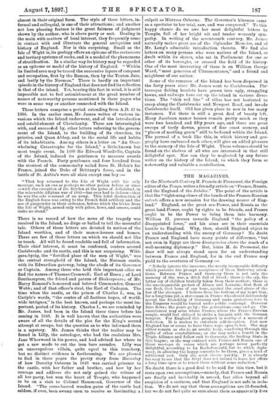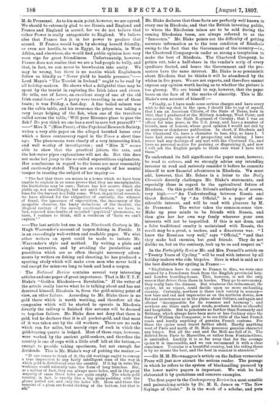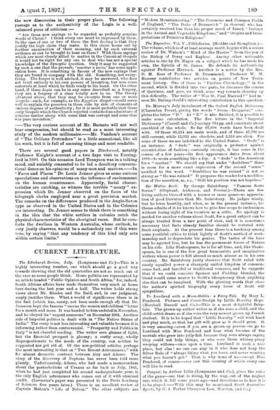THE MAGAZINES.
IN the Nineteenth Century M. Francis de Pressens6, the Foreign editor of the Temps, writes a friendly article on "France, Russia, and the England of the Jubilee." The point of the article is that the "tightening closer of the bonds of the Franco-Russian entente offers a new occasion for the drawing nearer of Eng- land." England, as the great sea-Power, and Russia as the
great land-Power, ought by rights to be friends, and France ought to be the Power to bring them into harmony. William II. pursues towards England "the policy of a disappointed lover," and his aims are in their essentials
hostile to England. Why, then, should England object to an understanding with the enemy of Germany ? No doubt France and England have many points of difference, "but not even in Egypt are these divergencies above the reach of a well-meaning diplomacy." But, hints M. de Pressensfi, the door will not always stand open for an understanding between France and England, for in the end France may yield to the overtures of Germany :— "Nobody ignores the immense, the nearly insuperable difficulty which prevents the prompt acceptance of these flattering atten- tions. Between France and Germany there is not only the memory of the war, a ditch full of blood : there is the cry, the bitter cry of children brutally taken from their mother; there is the unconquerable protest of Alsace and Lorraine, that flesh of our flesh, that bone of our bone, against the cruel abuse of the law of the stronger. I believe from the bottom of my heart that, for a long time yet, a statesman in France who should deliberately accept the friendship of Germany and make gratuitous love to the Emperor would be buried under public contempt. However time flows ; the years go by ; the generations come and go. Cir- cumstances may arise where France, where the Franco-Russian couple, would feel obliged to strike a bargain with the German tempter. For England this prospect is worthy of a moment of reflection. It is useless to entertain self-deception. Just now England has or seems to have three ways open to her. She may either remain as she is, an erratic body, wandering through the paths of other constellations ; or she may make a fourth in the Triple Alliance and follow suit to Germany, the leading State in this league; or she may contract with France and Russia one of those mariages de raison which are perhaps never perfectly delightful, according to La Rochefoucauld, but to which diplo- macy, in allowing the happy consorts to be three, gives a kind of additional zest. Only she must choose quickly. It is already too easy to see that the Sibyl does not intend to leave her offers a long time open or to renew them without some reduction."
No doubt there is a good deal to be said for this view, but it rests upon two assumptions,—namely, tbat France and Russia are finally and inevitably in accord, fast allies beyond all suspicion of a coolness, and that England is not safe in isola- tion. We do not say that these assumptions are ill-founded, but we do not feel quite so sure about them as apparently does
M. de Pressena& As to his main point, however, we are agreed.
We should be extremely glad to see Russia and England and France and England in accord, for we do not believe that either Power is really antagonistic to England. We believe also that France has it in her power to produce that accord. If France would begin by showing herself friendly, or even not hostile, to us in Egypt, in Abyssinia, in West Africa, and elsewhere, she would find public opinion here very soon ripe for great friendliness. Unfortunately, however, France does not realise that we are a bad people to bully, and that, in fact, we can never be browbeaten into amity. We may be wrong, but there is no maxim which Englishmen follow so blindly as "Never yield to hostile pressure."— Lord Mayo's "The Tourist in Ireland" ought to be read by all holiday-makers. He shows what a delightful time may be spent by the tourist in exploring the Irish lakes and rivers. He tells, out of Lever, an excellent story of one of the old Irish canal-boats :—" A party were travelling in one of these boats ; it was Friday, a fast-day. A fine boiled salmon was on the cabin table, and his reverence the priest was taking a very large helping of the fish, when one of the travellers called across the table, 'Will your Rivrence plase to pass the fish ? Do you think no one has a sowl to save but yourself ? ' " —" Miss X "(Miss Freer), of the Psychical Research Society, writes a very able paper on the alleged haunted house over which a fierce controversy raged in the Times a short time ago. The phenomena were clearly of a very interesting kind, and well worthy of investigation ; and "Miss X" seems able to show that the practical jokers, the rats, and the hot-water pipes explanations will not do. But this does not make her jump to the so-called superstitious explanation. Her conclusions in regard to the house are most reasonably and cautiously stated. They are an example of her mental 'temper in treating the subject of her inquiry :—
" The fact that there are noises in a house which we have been unable to explain in no sense proves that they are unexplainable, the limitations may be ours ; Nature has her secrets which she yields up, not unwillingly, but not until they are ripe and the time for the harvest has fully come. When, in psychical research, we have allowed for the vulgarities of curiosity, the vileness of fraud, the ignorance of superstition, the inaccuracy of the incapable observer, the hasty deductions of the theorist, the illogical ravings of the merely emotional—when we have, in fact, rejected nine-tenths of so-called 'psychical' phenomena, we .have, I venture to think, still a residuum of facts we can't
"
—The last article but one in the Nineteenth Century is Mr. Hugh Warrender's account of tarpon fishing in Florida. It
, is an exceedingly well-written and readable paper. We wish other writers on sport could be made to imitate Mr.
j Warrender's style and method. By writing a plain and simple narrative, and by avoiding the jocularities and puerilities which are so often thought necessary adorn- ments by writers on fishing and shooting, he has produced a sporting study which will make even men who never held a rod except for minnows long to hook and land a tarpon.
I The National Review contains several very interesting articles and one paper of great importance. That is Mr. T. Y. F. Blake's "Golden Rhodesia—a Revelation." If the writer of the article really knows what he is talking about and has not deceived himself, Rhodesia is, from the gold-mining point of view, an utter failure. According to Mr. Blake there is no gold there which is worth working, and therefore all the companies which will be started to operate in Rhodesia directly the railway is finished this autumn will be doomed to hopeless failure. Mr. Blake does not deny that there is gold, but he declares that it is all pocket-gold, and that most of it was taken out by the old workers. There are no reefs which run for miles, but merely cups of rock in which the
gold-hearing quartz is lodged. Most of these cups, however, were worked by the ancient gold-seekers, and therefore the country is one of cups with a little stuff left at the bottom,—
enough to provide taking specimens, but not enough for dividends. This is Mr. Blake's way of putting the matter :—
" If one comes to think of it, the old workings ought to convey a true impression to any fairly intelligent man of the way in which gold is distributed over the country. If it lay in veins the workings would naturally take the form of long trenches. But, As a matter of fact, they are always mere holes, and in the great majority of cases these holes are quite empty. The whole gold rountry, in fact, is exactly like a big plum-pudding with the plums pulled out, and only the holes left. Here and there the remains of a plum are found sticking at the bottom, but that is
Mr. Blake declares that these facts are perfectly well known to every one in Rhodesia, and that the British investing public, to whom the Rhodesian mines are to be sold daring the coming Rhodesian boom, are always referred to as the "Innocents." Mr. Blake points out the difficulty of getting accurate information as to the true condition of Rhodesia owing to the fact that the Government of the country—i.e., the Chartered Company—is under so strong a temptation to make the best of Rhodesia. The Chartered Company, he points out, take a half-share in the vendor's scrip of every syndicate floated, and hence the Government and the pro. moters have the same interest. Mr. Blake is so pessimistic about Rhodesia that he thinks it will be abandoned by the whites in five years. We are not experts, and therefore cannot express any opinion worth having as to whether the picture is too gloomy. We are bound to say, however, that the rapes bears on the face of it the marks of sincerity. This is Mr. Blake's own account of himself :—
"Finally, as I have made some serious charges and have every wish to fire my shot in the open, I should like to say of myself, that I am an American Citizen, of the State of Texas, born in 185G, that I graduated at the Military Academy, West Point, and was assigned to the Sixth Regiment of Cavalry; that I was an officer for nine years, in the U.S. Army, and have a number of friends, men of honour, whose good opinion I would not risk by an untrue or slanderous publication. In short, if Rhodesia and the Chartered Co. have a character to lose, why, so have I. I have had some experienae of prospecting and mining. I have never had any dealings of any sort with the Chartered Co., and have no personal motive for praising or dispraising it, and now I will ask the English people to think over what I have told them."
To understand its full significance the paper must, however, be read in extenso, and we strongly advise any intending investor to read and seriously consider it before he commits himself to new financial adventures in Rhodesia. We must add, however, that Mr. Mous in a letter to the Dailg Chronicle directly challenges Mr. Blake's statements, and especially those in regard to the agricultural future of Rhodesia. On this point Mr. Selons's authority is, of course, very high.—" An Understanding between Russia and Great Britain," by "An Official," is a paper of con- siderable interest, and will be read with pleasure by M. de Pressens& The writer takes the common-sense view. Make up your minds to be friends with Russia, and then give her her own way freely wherever your own interests will not be imperilled. If this is not done, and a false traditional enmity is maintained with Russia, the result may be a great, a useless, and a disastrous war. "I know the Russians very well," says "Official," "and that they make bad enemies, but good friends. They do not dislike us, but on the contrary, look up to us and respect us."
In the Fortnightly Review Mr. and Mrs. Pennell's article on "Twenty Years of Cycling" will be read with interest by all holiday-makers who ride bicycles. Here is what is said as to the best districts for cycling in France :—
" Englishmen have to come to France to dine, we were once assured by a Frenchman fresh from the English provincial hotel and London boarding-house. This, however, is not the on13 reason that drives them there in hordes. They go to save moneys they really hate the dinners. But whatever the inducement, the cycler, let us repeat, could decide upon no more enchanting country. Certainly, nowhere is there such variety in scenery— now bare and sad and impressive as on the northern downs, now fiat and monotonous as in the plains about Orleans, and again and oftener 'incomparable for its romance and harmony '; and nowhere are there such good roads, nowhere hotels so cheerful and hospitable. But to penetrate no farther than Normandy and Brittany, which always have been more or less Cockney since the time of William the Conqueror, is to see little of the best French roads and hardly anything of genuine French customs. For these the cycler must travel farther afield. Hardly anything west of Paris and north of St. Maio possesses genuine character any longer. But all the east and the Midi are full of it. The district from Paris to Marseilles, or rather from Fontainebleau, is unrivalled. Luckily it is so far away that for the average cycler it is inaccessible, and we can recommend it with a clear conscience. Touraine is a beautiful country, but the riding there is by no means the best, and the heat in summer is atrocious."
Sir M. M. Bhownaggree's article on the Indian vernacular Press will just now attract the serious reader. The passage in which he refers to the system of blackmailing pursued by the lower native papers is important. We wish he had elaborated it by quotations and concrete examples.
The first paper in the Contemporary Review is a most sensible and painstaking article by Dr. M. R. James on "The New Sayings of Christ." It is the work of a scholar, and putts the new discoveries in their proper place. The following passage as to the authenticity of the Login is a well-
balanced piece of criticism :—
"Are these new sayings to be regarded as probably genuine words of Christ ? I think every one must be impressed by them. In the case of one or two of them the first feeling is that they justify the high claim they make. Is this claim borne out by further examination of their meaning, and by such external evidence as can be brought to bear on them ? With those sayings which-are most closely allied to matter in the Canonical Gospels it would not be right for any one to deal who has not a special knowledge of the Synoptic question. Only it may be suggested by such a one that the proverb, noseitur a wits,' has some appli- cation here. It is something in favour of the new sayings that they are found in company with the old. Something, not every- thing. The forger is well advised, it may be answered, who does not trust entirely to his own powers of invention, but uses some materials at least which he finds ready to his hand. On the other hand, if these Logic' can be in any sense described as a forgery, they are a forgery of a class totally new to us. The theory tdvanced above, that they may be excerpts from one or more aospels—such, for example, as the Egyptian Gospel—would serve well to explain the presence in them side by side of elements of various degrees of authenticity; for it is most probable that those early Gospels which the Church rejected contained an admixture of genuine matter along with some that was corrupt and some that was pure invention."
—The very curious account of Mr. Barnato will not well bear compression, but should be read as a most interesting
study of the modern millionaire.—Mr. Vandam's account of "The Orleans Pretenders" is a little sensational, like all his work, but it is full of amusing things and most readable.
There are several good papers in Blackwood, notably Professor Knight's account of a two days visit to Farling- ford in 1890. On this occasion Lord Tennyson was in a talking mood, and amiably consented to be led a desultory conversa- tional dance on his opinicns of many men and matters.—In
"Faces and Places" Dr. Louis Jenner gives us some curious speculations and observations on the influence of environment on the human countenance. Apparently, facial charac- teristics are catching, as witness the terrible " meaty " ex- pression which Dr. Jenner observed on the faces of the telegraph clerks employed near a great provision market.
The remarks on the dilferences produced in the Anglo-Saxon type as observed in the United States and in the Colonies are interesting. Dr. Jenner seems to think there is something in the idea that the white settlers in colonies catch the
physical characteristics a the aboriginal races. Bat he com- forts the dwellers in Western Australia, whose outlook, he very justly observes, would be a melancholy one if this were
true, by saying "that any tendency of this kind only acts within certain limits."




































 Previous page
Previous page